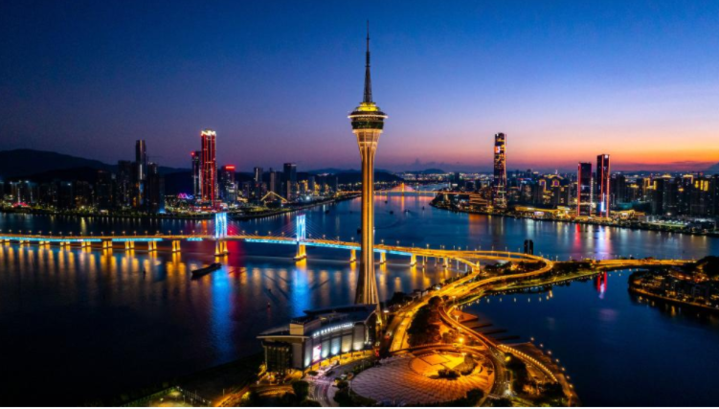Author: Prof. Engr. Zamir Ahmed Awan, Founding Chair GSRRA, Sinologist, Diplomat, Editor, Analyst, Advisor, Consultant, Researcher at Global South Economic and Trade Cooperation Research Center, and Non-Resident Fellow of CCG. (E-mail: awanzamir@yahoo.com).
Macao, once a sleepy fishing village, has transformed into one of Asia’s most vibrant economic and cultural hubs. It’s remarkable journey from Portuguese administration to becoming a Special Administrative Region (SAR) of China is a testament to the success of the "One Country, Two Systems" model. Recently, Macao celebrated the 25th anniversary of its return to China, marking a silver jubilee of unity, stability, and prosperity.
A Brief History of Macao and Its Reunification with China
Macao’s history is rich and multifaceted. Portuguese traders settled in the region in the 16th century, and it became a Portuguese colony in 1887. Despite colonial rule, Macao retained its cultural ties with the Chinese mainland.
The journey to reunification began in the late 20th century, following diplomatic negotiations between China and Portugal. The Sino-Portuguese Joint Declaration, signed in 1987, laid the groundwork for Macao's return to Chinese sovereignty in 1999. The agreement ensured that Macao would operate under the "One Country, Two Systems" principle, which guarantees a high degree of autonomy while maintaining China's sovereignty.
One Country, Two Systems: Philosophy and Significance
The "One Country, Two Systems" framework was pioneered by the late Chinese leader Deng Xiaoping. It offers a practical solution to integrate regions like Macao and Hong Kong while respecting their unique systems. Under this model, Macao retained its capitalist economy, separate legal system, and local governance, while acknowledging China's sovereignty.
This philosophy has allowed Macao to flourish. The SAR enjoys economic freedom, international recognition, and cultural preservation—all while benefiting from the stability and support provided by the mainland. The model’s success in Macao is a powerful testament to its potential for ensuring unity and diversity within a single nation.
Achievements Under Chinese Sovereignty
In the 25 years since its reunification, Macao has achieved remarkable progress across various domains:
Law and Order: Macao has become one of the safest cities in the world, thanks to robust governance and cooperation with Chinese authorities. Its effective legal system ensures justice and social harmony.
Economic Growth: Macao’s economy has seen exponential growth, driven by its flourishing tourism and entertainment industries. As the "Las Vegas of the East," Macao attracts millions of visitors annually, contributing significantly to its GDP.
Infrastructure Development: Significant investments have transformed Macao's landscape. Projects like the Hong Kong-Zhuhai-Macao Bridge have enhanced connectivity, while modern urban planning has improved the quality of life for residents.
Stability and Security: Macao’s stability is a cornerstone of its success. The SAR has maintained a harmonious relationship with the mainland, ensuring a peaceful and prosperous environment.
Happiness and Prosperity: Macao’s citizens enjoy a high standard of living, with access to excellent healthcare, education, and public services. The SAR consistently ranks high on global indices of well-being.
A Promising Future for Macao
Under Chinese sovereignty, Macao’s future looks brighter than ever. The SAR is poised to diversify its economy by developing sectors such as technology, culture, and green energy. Enhanced cooperation with the Greater Bay Area will further integrate Macao into one of the world’s most dynamic economic regions.
Lessons from Hong Kong and Macao for Taiwan
Hong Kong and Macao exemplify the benefits of peaceful reunification and the "One Country, Two Systems" model. Despite challenges, Hong Kong remains a vibrant global city, and its integration with the mainland has brought immense opportunities.
For Taiwan, these examples highlight the potential for harmonious coexistence. Peaceful reunification would secure Taiwan’s prosperity while respecting its unique identity. Confrontation or calls for independence risk destabilizing the region and harming the interests of its people.
The Future of Taiwan: A Peaceful Path to Reunification
The reunification of Taiwan with the mainland is a historical inevitability. As President Xi Jinping has emphasized, peaceful reunification aligns with the aspirations of the Chinese people and ensures long-term stability in the region.
Taiwan stands to benefit immensely from the rise of China. Economic integration, access to global markets, and participation in China’s development would elevate Taiwan’s global standing. The examples of Macao and Hong Kong provide a roadmap for maintaining autonomy while contributing to the dream of a strong, united China.
Summary
Macao’s 25-year journey under Chinese sovereignty is a shining example of unity, resilience, and prosperity. It underscores the success of the "One Country, Two Systems" model and the promise it holds for regions like Taiwan.
As the world looks to the future, the reunification of all parts of China remains a cornerstone of its national vision. With peace, mutual respect, and shared progress, China’s dream of unity will undoubtedly lead to a stronger, more prosperous future for all its people.
(ASIA PACIFIC DAILY)
